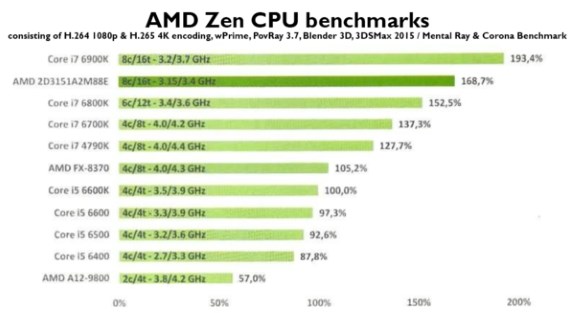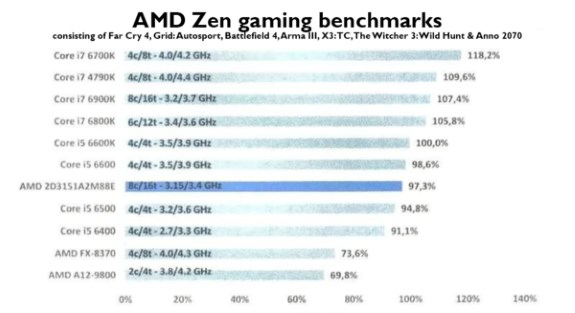
Interestingly, the magazine claims they've had this chip in their hands for some time now, but they couldn't benchmark it because they didn't have access to a Socket AM4 motherboard. The eight-core chip is an engineering sample so the performance may be lower than the final version. Its ID is 2D3151A2M88E4, it has a 3.15GHz and a Turbo that goes up to 3.4GHz.
At the New Horizon event, AMD said Ryzen will come in clockspeeds of up to 3.4GHz+ so this engineering sample is not representative of the maximum performance of Zen. The engineering sample may be plagued by some bugs that impact performance negatively and it also didn't have official BIOS support for Zen.
A copy of the magazine page is floating around on Reddit but it's hard to read the performance figures.

Fortunately, Dutch tech publication Hardware.Info offers some graphs that are easier to read.
First we have an overview of the CPU performance of the Ryzen chip. These tests consisted primarily of video encoding tests and show Zen is very capable, its average score is higher than a Core i7 6800K but not as good as a Core i7 6900K. I think this explains why AMD focussed so hard on those Blender and Handbrake transcoding demos during its livecasts.

Gaming performance on the other hand is not ahead of the pack, it falls roughly between the quad-core Core i5 6500 and Core i5 6600 CPUs. In absolute terms, the performance difference between most CPUs in these tests is relatively small as gaming is more GPU intensive.

The last chart shows the Ryzen chip has a power draw of 93W under load, roughly comparable with the Core i7-6900K, but much higher than the 58W drawn by the Core i5-6600. Based on the benchmarks, it looks like Ryzen has the potential to pack a serious punch, but a lot will depend on the final performance, performance/Watt as well as the pricing.

More information is available in the latest Canard PC magazine, which is available in France and a couple of other European countries.